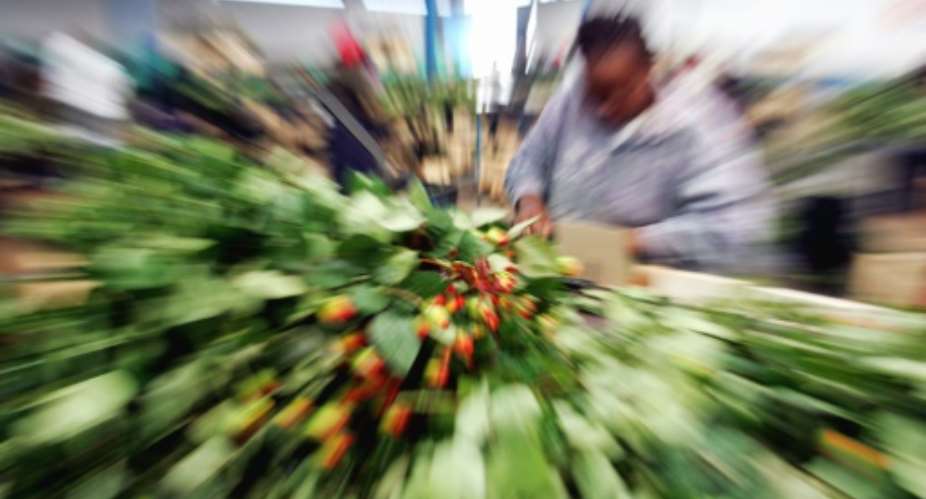With passenger traffic in a slump, airlines are turning to freight to fill the gap -- and Kenya Airways spies an advantage in the market to deliver temperature-sensitive Covid vaccines: its expertise in flying fresh roses to Europe.
Some 3,000 tonnes of flowers are currently exported every week from Nairobi's international airport under demanding cool-storage conditions akin to those required to safely ship Covid vaccines.
Jabs earmarked for Africa risk spoilage if not transported within precise temperature ranges from ground handling to shipment and delivery -- a logistical feat beyond many infrastructure-poor countries on the continent.
"That is the range we manage our fresh flowers, so it's very common and well known in our temperature control mechanisms," Peter Musola, Kenya Airways' general manager of cargo, told AFP in an interview this week.
"Around fresh, cool-chain management, I will tell you Nairobi is way ahead of so many countries."
The airline serves the major air hubs in Africa, has long-established routes to Europe and on Friday introduced a flight to Delhi, with an eye on business to ship Covishield, the Indian-made Oxford/AstraZeneca vaccine.
It has converted passenger planes to cargo freighters and opened a pharmaceutical storage facility capable of storing tonnes of vaccines, as it courts the big business of bringing vaccines to more than a billion Africans.
Flower power
The airline faces stiff competition from Ethiopian Airlines, the state-owned rival next door.
Africa's largest carrier, Ethiopian welcomed its first coronavirus vaccines this month. The shipment from China, destined for Chad, showcased the airline's ambition for contintent-wide distribution, and its own capability at cold-storage technology.
Kenya is expected to receive its first vaccines this month, though a date has not been set, and Musola stressed KQ is ready to serve: "Charity begins at home."
But the national carrier is keen to demonstrate it has an edge in transporting delicate cargo no matter where it is needed.
Every day, Kenya's coveted roses and carnations are cut and packed by hand, rushed by refrigerated truck 100 kilometres (60 miles) to Nairobi, placed aboard cargo planes and flown to Europe.
To keep the petals fresh and vibrant, the flowers must be kept between two and eight degrees Celsius (35-46 degrees Fahrenheit) the entire way.
Buyers use trackers inside shipments to ensure the "cold chain" remains unbroken from farms on the Equator to the market floor in Amsterdam.
Some coronavirus vaccines on the market, such as those produced by Pfizer and Moderna, must be kept in extreme freezers seldom available on the continent.
As a result, many African governments have gravitated to the Sinopharm, AstraZeneca and Johnson&Johnson vaccines that, like flowers, also keep at two to eight degrees C.
"This is really one big advantage that Kenya will have: the experience in handling fresh products will really be a great value-add in managing the temperature control for the vaccines," Musola said.
'Something else will come'
The vaccine-transport business would bring much-needed revenue to the struggling airline.
Kenya Airways cargo operations grew slightly in 2020 but passenger services, its main source of revenue, collapsed as the pandemic gutted demand for international travel.
 Covid casualty: Grounded Kenyan Airways planes at Nairobi airport last April. By TONY KARUMBA (AFP)
Covid casualty: Grounded Kenyan Airways planes at Nairobi airport last April. By TONY KARUMBA (AFP)
The government has quietly given the airline $91 million (75 million euros) to cover losses, after a year in which the firm had to axe hundreds of jobs, Business Daily reported this week.
To reflect the economic realities, Kenya Airways this week unveiled its first repurposed Dreamliner 787 to cater to expanding cargo demand, with a second in the works.
Musola said the 50-tonne freighter had interested the market.
In the coming busy months, with frequent charters to European capitals with flowers for Valentine's Day and Mother's Day, Kenya Airways hopes the fleet can return with vaccines aboard.
Musola said a "world-class" cold-storage facility opened in September can safely turnover 300 tonnes of vaccines and other pharmaceutical products every six hours. It includes a deep freezer capable of keeping Moderna's vaccine below minus 20 C.
The airline sees a return on investment beyond coronavirus in serving Africa with other much-needed medical supplies.
"We believe even after Covid, something else will come, so we want to position ourselves for a sustainable solution to the industry," he said.





 MASLOC former boss sentenced to 10 years in prison with hard labour
MASLOC former boss sentenced to 10 years in prison with hard labour
 Convert National Cathedral site to tourist centre — Spio-Garbrah to govt
Convert National Cathedral site to tourist centre — Spio-Garbrah to govt
 2024 election: Don’t be scared; we're ready to maintain law and order – Dampare ...
2024 election: Don’t be scared; we're ready to maintain law and order – Dampare ...
 NDC to officially outdoor Prof Jane Naana as 2024 running mate on April 24
NDC to officially outdoor Prof Jane Naana as 2024 running mate on April 24
 ECG board members slapped GHS5.8 million fine by PURC for failing to alert publi...
ECG board members slapped GHS5.8 million fine by PURC for failing to alert publi...
 I never left NPP, they 'sacked' me for attending Alan's programme; even a $100mi...
I never left NPP, they 'sacked' me for attending Alan's programme; even a $100mi...
 Fuel prices go up today
Fuel prices go up today
 Anti-gay bill: Your stance serves no purpose; either you actively advocate for t...
Anti-gay bill: Your stance serves no purpose; either you actively advocate for t...
 Tension brews as NPP Seattle clashes with national leadership over parallel chap...
Tension brews as NPP Seattle clashes with national leadership over parallel chap...
 Anti-gay bill: You've done nothing in Ghana to prove you're against LGBTQ+; ther...
Anti-gay bill: You've done nothing in Ghana to prove you're against LGBTQ+; ther...
